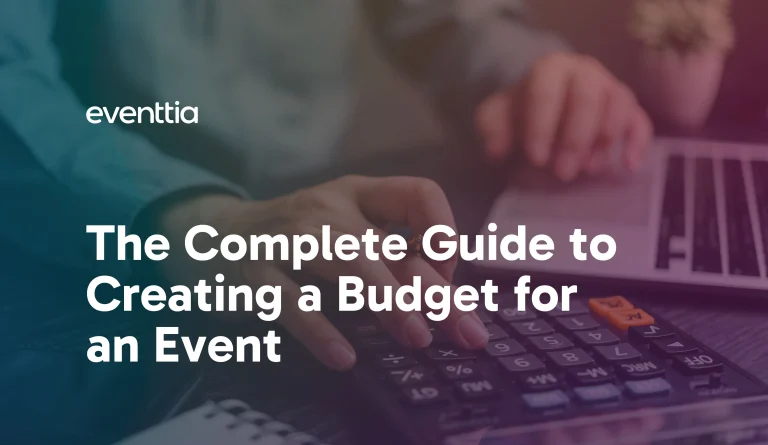How to Create a Budget for an Event: Quick Summary
Why does event budgeting matter?
Event costs can spiral quickly without structure. A clear, adaptable budget not only keeps spending under control but also improves ROI, strengthens accountability, and reduces stress.
Here’s what to know:
Benefits of budgeting: Keeps financial control, prioritizes spending, streamlines planning, reduces risks, ensures accountability, and allows post-event performance measurement.
Challenges: Budgeting is time-intensive, prone to unforeseen expenses, subject to market fluctuations, and requires balancing quality with costs and stakeholder expectations.
Key budget categories: Event management software, venue, catering, AV equipment, décor, signage, speakers, entertainment, vendors, and contingency funds.
Step-by-step guide: Start with a big-picture cap, break down costs by category, set aside 10–15% for surprises, track and adjust, get multiple vendor quotes, factor in revenue streams, and document everything.
Smart cost-cutting: Book venues early and outside peak days, right-size food and beverage orders, negotiate AV transparently, and protect savings with multi-year contracts.
Template example: A mid-sized marketing event (~200 attendees) budget runs ~$20,850, but costs can be reduced by consolidating tech (e.g., using Eventtia to handle registration, promotion, and analytics in one platform).
Whether you're planning a corporate retreat, a nonprofit fundraiser, or a wedding, one thing is certain: event costs can spiral quickly without a clear budget. And with inflation and rising vendor costs, creating a realistic, adaptable event budget is more crucial than ever. In fact, recent data from Knowland indicated that almost 50% of event professionals consider the increased price of putting on events to be the biggest challenge they face.
A well-structured budget doesn’t just help you stay within financial limits, it can improve ROI, reduce stress, and streamline your entire planning process. In this guide, we’ll walk you through everything you need to know to build an effective event budget from scratch.
We’ll also explain that in some cases, increasing your event planning budget can actually save you money in the long run. With dedicated event management software like Eventtia, you can streamline your event organization, boost the number of attendees, and increase your ROI.
Why is it Important to Establish a Budget for an Event?
Fundamental to the performance of any event, event budgeting involves multiple benefits that you can take advantage of. Here are some of them:
Financial Control
When organizing an event, costs can quickly spiral if not monitored closely. A budget ensures that the organizer remains within the designated financial parameters by providing a holistic view of all financial touchpoints. This proactive oversight prevents overspending and helps maintain financial health throughout the event planning and execution phases.
Prioritization
Some elements are critical to the event’s success, while others, though desirable, may not be necessary. A budget forces the organizer to scrutinize each expense, weighing its importance against available funds. This rigorous assessment helps allocate funds to the most crucial aspects first and determine where cost-saving measures or compromises might be appropriate.
Enhanced Planning
Budgeting is an integral part of the planning process. When there’s a clear financial blueprint in place, it aids in streamlining other planning components. Whether deciding on the venue, entertainment, catering, or marketing strategy, knowing the budget constraints and allocations can guide decisions, ensuring that all arrangements are cohesive and within the set financial boundaries.
Risk Mitigation
Unforeseen expenses or financial overruns can jeopardize an event’s success. A detailed budget acts as an early warning system, spotlighting areas where costs might exceed estimates or revenue might fall short. By identifying these potential pitfalls in advance, organizers can take preventive measures by reallocating funds, renegotiating with vendors, or adjusting event components to fit within the budget.
Increased Accountability
In events, especially those with multiple stakeholders, there’s a need for fiscal responsibility and transparency. A budget serves as a record of intended expenditures, and as expenses are incurred, they can be checked against this record. This ensures that every financial decision can be justified and there’s clarity on where funds are being utilized, ensuring stakeholders’ trust and promoting financial integrity.
Clear Communication
Budgets are not just internal tools; they are communication devices. When shared with stakeholders – sponsors, partners, or team members – a detailed budget clarifies the event’s financial landscape. This ensures everyone has aligned expectations and understands the financial constraints and objectives, leading to more harmonious collaborations and fewer misunderstandings.
Performance Measurement
Once an event is over, brands can assess the event’s financial performance by comparing projected costs and revenues with actual figures. This post-event analysis can spotlight areas of improvement, inform decisions for future budgets, and serve as a benchmark for measuring the success of subsequent events.
What are the Challenges with Event Budgeting?
While there are a lot of advantages to creating a budget for an event, there are also some challenges, including:
Time-Consuming
Budgeting, especially for events, is a complex task. It demands meticulous attention to detail and a comprehensive understanding of the event’s scope. Crafting a precise budget means analyzing every foreseeable cost, from major expenses like venue rentals to minute details such as giveaways during check-in.
Also, forecasting potential revenue sources, such as ticket sales or sponsorships, requires careful analysis. This thoroughness ensures that all financial angles are covered, but it undeniably demands a significant investment of time.
Unforeseen Expenses
Despite the most diligent budgeting efforts, events can be unpredictable. Unexpected costs can emerge from various corners – last-minute equipment repairs, additional personnel requirements, or unforeseen logistical challenges.
These unexpected expenses can strain the predefined budgetary boundaries, demanding rapid adjustments and potentially impacting other areas of the event’s financial landscape.
Dynamic Changes
The event industry is susceptible to market fluctuations. Prices for services or products might escalate due to demand surges, seasonal variations, or external economic factors. Similarly, a previously available service or product might become scarce, requiring a vendor change or strategy.
Such dynamism requires the budget to be flexible and adaptable, with organizers constantly attuned to these shifts and ready to recalibrate their financial plans accordingly.
Balancing Quality and Cost
High-end venues, gourmet catering, top-tier entertainment, and state-of-the-art equipment all carry premium price tags. Balancing the desire to offer an unparalleled event experience with the constraints of a set budget becomes challenging.
This is particularly pronounced when resources are limited, compelling organizers to make tough decisions on where to allocate funds without compromising the event’s overall quality.
Estimation Errors
Budgeting involves a fair amount of prediction which may fail. Whether it’s an overestimation of ticket sales or an underestimation of logistical costs, errors in financial forecasting can have impactful consequences.
Such miscalculations can lead to budget shortfalls or surpluses, which present challenges. Shortfalls require cutting corners or seeking additional funding, while surpluses prompt questions about potential missed opportunities or overpricing.
Stakeholder Disagreements
Events often involve multiple stakeholders, each with their vision and priorities. These can range from sponsors and investors to partners and participants. With varied perspectives come differing opinions on how the budget should be structured.
Some prioritize marketing, while others emphasize the event’s content or entertainment. Navigating these differing views requires diplomacy and negotiation skills, as disagreements can potentially lead to conflicts or jeopardize the event’s success if not adequately addressed.
What to Factor Into Your Budget for an Event
This guide covers the particular needs of large consumer and luxury retail companies such as Decathlon, L’Oréal, and Hermès, who organize many in-person events with the assistance of agencies. With that in mind, let’s explore the key components of an event budget:
Event Management Software
Event management software enables you to streamline all elements of your event, from creating a branded website to managing RSVPs and guest email lists. For example, Eventtia offers event planning, execution, and monitoring all on one simple platform, and can increase ROI for in-person, hybrid, and virtual events.
When budgeting for your event management software, here are some factors to keep in mind:
- Subscription Model: Event management solutions have different pricing models. Some software platforms charge monthly or annually, while others might have a per-event or per-license fee.
- Additional Features and Services: Custom email domains, white label, premium support, additional admin users, extended API for event management, etc.
- Customization: Tailoring the software to fit your specific needs might incur additional charges.
- Customer support: Although most platforms offer digital guides and tutorials, a few providers offer advanced onboarding and training sessions to their enterprise clients.
Venue
- Type and Location: Choosing a venue is a critical decision. Hotels might provide a luxurious backdrop but come with a hefty price tag. Open grounds offer flexibility in layout but might need more investment in setting up. Urban venues in prime locations naturally cost more due to their demand and accessibility compared to those in quieter, suburban areas.
- Amenities: When booking a venue, it’s vital to understand what’s included. Some places might offer chairs, tables, or even basic sound systems as part of the package. However, others might list them as add-ons, potentially surprising you with extra costs.
- Duration of Rental: How venue charges can greatly affect your budget. Hourly rates might seem low initially, but costs can add up if your event runs over time. On the other hand, a flat fee provides cost certainty but might be higher upfront.
- In-house Services: Some venues simplify planning by bundling services like food or decorations. This can sometimes save money, but the trade-off might be less customization or vendor choice.
Decor and Ambiance
- Scale of Decor: The visual feel of your event matters. Grand, detailed setups with thematic elements will cost more due to the intricate work and materials involved. In contrast, simple, understated designs might be lighter on the wallet.
- Rental vs. Purchase: If you need special decor items, renting might be best for one-time use. But if the item is unique or will be used often, buying could be cost-effective in the long run.
- Installation and Removal: Big or intricate decorations might need experts to set them up and take them down. This service can add to the overall decor budget.
Signage and Branding
- Custom Creations: Personalized branding elements, like banners or displays tailored to your event, stand out but cost more due to the customization involved.
- Material and Durability: If your event is outdoors or spans several days, you’ll need signs that can withstand the elements, which might be more expensive.
- Design Costs: If you don’t have in-house designers, creating the perfect branding might mean hiring professionals and adding costs.
Audio-visual (AV) Equipment
- Latest Tech vs. Basic: Cutting-edge sound and display equipment can elevate the event experience but comes at a premium. On the other hand, basic gear is more affordable but might not offer the same quality.
- Operator Costs: High-tech gear often needs skilled people to run it. Hiring these experts is an added expense.
- Live Streaming: Broadcasting your event online means investing in quality cameras, platforms, and streaming tools, adding to your tech costs.
Catering
- Type of Cuisine: Special menus, like gourmet or ethnic dishes, require specialty ingredients and chefs, making them pricier.
- Service Style: Different serving methods, like buffets or plated dinners, have varying costs.
- Special Requests: Offering diverse options or catering to dietary needs can increase costs.
- Staffing: More than just chefs, you might need bartenders, or other staff members, adding to the bill.
- Equipment and Rentals: Serving the food might need extra gear, like dishes or tables.
- Licenses: Serving certain items, especially alcohol, often requires permits that come with fees.
Speakers, Influencers, and KOLs
- Professional Fees: Big-name influencers and KOLs naturally charge more due to their reputation and demand.
- Travel and Accommodation: If your guest isn’t local, you’ll need to cover their travel and stay, adding to costs.
Entertainment
- Type of Act: Different performers have different fees. Famous acts or unique performances, like magic shows, usually cost more.
- Duration: Longer performances might mean higher charges.
- Equipment Needs: Some performers bring their gear, while others might need you to provide it.
Other Vendors
- Agency Costs: Large retail brands often use agencies to handle event details, which have their fees.
- Security Staff: Keeping your event secure, especially at entry points, means hiring security, adding to costs.
- Specialty Services: Unique features, like fireworks or photo booths, come with their price tags.
- Vendor Experience: More experienced vendors might do better work but charge more.
- Package Deals: Some vendors offer deals that bundle services, which can offer savings but might include services you don’t need.
How to Create a Budget for an Event: Step-By-Step Guide
Step 1. Start with the Big Picture
Before diving into the specifics, take a moment to visualize the entire event. Ask yourself, what’s the maximum amount you can or want to spend? If you’ve organized events before, revisiting past budgets can provide a realistic benchmark to guide your current planning.
Step 2. Break Down the Costs
List every conceivable expense related to your event, from venue rental to the last paper napkin. With the total budget in mind, assign a specific dollar or euro amount or percentage to each expense category, ensuring that the sum of all these allocations does not exceed your total budget.
Step 3. Account for Miscellaneous and Unexpected Costs
The event industry is unpredictable. Sometimes, unforeseen expenses pop up, or prices rise unexpectedly. Set aside a contingency fund to avoid scrambling for funds at the last minute. A commonly adopted rule is reserving 10-15% of your budget for unexpected costs.
Step 4. Track and Adjust the Budget as Necessary
A budget isn’t static. As you move closer to the event date, you’ll get more accurate quotes, and some actual expenses will become clear. Budgeting tools or specialized software can help you track these changes and adjust your allocations as required.
Step 5. Prioritize Expenditures
Determine what elements of your event are non-negotiable and which ones can be adjusted. Recognizing these priorities will guide you when making budgetary decisions, especially if funds become tight.
Step 6. Get Multiple Quotes
For significant expenses, don’t settle on the first quote you receive. Approach multiple vendors. This helps ensure you aren’t overpaying and gives you a clearer understanding of the market rate, allowing you to negotiate better.
Step 7. Factor in Revenue
Expenses are just one side of the equation. Your event might have revenue streams—like ticket sales, sponsorships, or merchandise. Estimating and including these revenues can give you a clearer picture of your net budget, helping further allocate or reallocate funds.
Step 8. Review Contractual Obligations
When engaging with vendors or venues, contracts are standard. It’s imperative to read through these documents carefully. They might contain details on deposits, cancellation penalties, and other costs that might not be evident upfront but can impact your budget later.
Step 9. Document Everything
Maintaining a thorough record of every financial transaction, contract, and communication helps ensure transparency. Detailed documentation will be invaluable, especially when reviewing the event’s financial aspects or if disputes arise.
Step 10. Seek Feedback
After the event concludes, gather opinions, especially from stakeholders or those directly involved in the financial aspects. Did they feel the money was well-spent? Were there areas of unnecessary overspending or places where more funds could have enhanced the experience? This feedback is invaluable for refining budgets for future events.
Budget Format for an Event: Example and Template
A clear, categorized, and flexible budget format for events allows you to track actual spending against projected costs, allocate funds strategically, and avoid last-minute financial surprises.
Below is a detailed example budget for a mid-sized in-person marketing event (such as a product launch, seminar, or brand activation). You can use this as a template by adjusting the categories so that they relate to your specific event.
Sample Event Budget: Marketing Seminar (200 Attendees)
Category | Item | Estimated Cost | Actual Cost | Notes |
Venue & Logistics | Venue Rental | $3,000 | 8 hours at city conference hall | |
AV Equipment | $1,200 | Includes tech support | ||
Security | $600 | 2 guards for full event | ||
Insurance | $350 | Liability coverage | ||
Marketing and Promotion | Digital Ads (Google, Meta) | $2,000 | 3-week paid campaign | |
Email Marketing Platform | $150 | Monthly subscription | ||
Print Materials (flyers, signage) | $500 | Includes banners and handouts | ||
Speakers and Programming | Keynote Speaker Fee | $2,500 | Includes travel & accommodation | |
Panelist Honoraria | $1,000 | $250 per speaker x4 | ||
Workshop Supplies | $300 | Pens, notepads, flip charts | ||
Catering and Hospitality | Breakfast and Coffee Service | $1,000 | Local catering | |
Lunch (Boxed Meals) | $2,000 | $10 per person x 200 | ||
Water/Snacks | $400 | Refill stations & granola bars | ||
Staff and Volunteers | Event Staff (check-in, support) | $1,500 | 5 staff @ $25/hr x 12 hrs | |
Volunteer T-Shirts and Meals | $300 | 10 shirts + food | ||
Technology and Registration | Event Registration Software | $250 | One-time fee | |
Mobile Event App | $600 | Custom branding included | ||
Miscellaneous | Contingency (10% buffer) | $1,400 | For unexpected expenses | |
Swag and Giveaways | $800 | Branded tote bags | ||
TOTAL ESTIMATED | $20,850 |
Once your budget is laid out in a spreadsheet, you might be able to identify areas where you can cut costs. For example, we can see above that there are separate costs associated with event registration software, a mobile event app, and digital event marketing. By investing in an all-in-one platform like Eventtia, you can combine and reduce these costs, while streamlining your event management and increasing ROI.
How to Cut Your Event Budget Without Affecting the Experience
Reducing your event budget doesn’t have to mean sacrificing quality, engagement, or attendee satisfaction. With strategic planning, you can cut costs significantly while still delivering an unforgettable experience. Here are some tips to help you get started:
Tip #1: Get Strategic With Venue Selection
Venue costs are often the largest line item, and one of the easiest places to overspend if you’re not careful. To keep your event grounded financially from the start:
- Plan far in advance: For large-scale events, aim to book venues 24–36 months ahead to secure favorable rates and wider options.
- Look beyond major metros: Tier 2 cities near major hubs offer comparable facilities at a fraction of the price, with more room for customization and negotiation.
- Lean on a meeting broker: If you’re booking a block of hotel rooms, these professionals can help you navigate hotel contracts, speak the industry’s language, and find hidden savings.
- Pick your days wisely: Hosting events from Sunday through Wednesday can unlock lower venue rental rates and better availability.
Tip #2: Tame the Food & Beverage Budget
Food and beverage can devour 30% to 50% of your event budget, but with some smart adjustments, you can keep guests satisfied without going overboard.
- Rely on previous attendance data: If only half your attendees typically show up for breakfast, don’t cater for everyone.
- Offer “on request” items: Decaf coffee, tea, and sodas can be expensive and underused. Keep them available, but don’t overstock.
- Lock in beverage pricing: Set maximums for coffee, water, and soda in your contract to avoid cost creep.
- Negotiate smarter gratuities: Base gratuities on discounted or negotiated prices, not full retail rates.
- Track travel patterns: If a significant number of attendees are leaving early, you might be able to cut final-day meals altogether.
Tip #3: Avoid Surprise AV Costs
Audio-visual costs are notoriously tricky, thanks to labor fees, equipment rentals, and commission structures that aren’t always transparent. Here’s how to avoid surprises:
- Get AV quotes before locking in your venue: Venue-exclusive AV providers can limit your options and inflate your costs.
- Ask for detailed quotes: Request itemized proposals that include model numbers. This helps you compare equipment and labor apples-to-apples.
- Watch for hidden commissions: Many in-house AV vendors pay a commission to the hotel, which gets passed on to you. Ask directly about these fees.
- Compare labor structures: Understand whether the facility is unionized and how that affects staffing costs and flexibility.
Tip #4: Safeguard Savings and Future-Proof Your Budget
Once you’ve identified savings opportunities, protect them for this event and future ones:
- Use AI-powered tools: Contract review software or platforms like ChatGPT can scan for hidden cancellation clauses, pricing escalations, and fees that slip through the cracks.
- Negotiate multi-year deals: If you’re planning recurring events, locking in F&B and AV pricing now can save you thousands in future inflationary costs.
- Build trusted vendor relationships: Long-term partnerships with your AV team, caterers, and brokers can translate to flexible terms and consistent service, often with built-in savings.
Key Takeaways: How to Create a Budget for an Event
From your venue and AV setup to catering and marketing, every aspect of your event is tied to the strength of your budget. The more accurate and strategic your budget, the smoother your planning process will be, and the more value you’ll deliver to attendees and stakeholders.
Now that you know how to create a budget for an event, you can think about where you may be able to cut some of your event-related costs. As mentioned earlier, consolidating your event tech is a great place to start, and Eventtia lets you do just that.
Schedule a demo to learn how Eventtia can streamline event management and level-up the guest experience at your next event.
Discover how Eventtia helps world-leading brands digitize and scale their events
Learn moreShare





